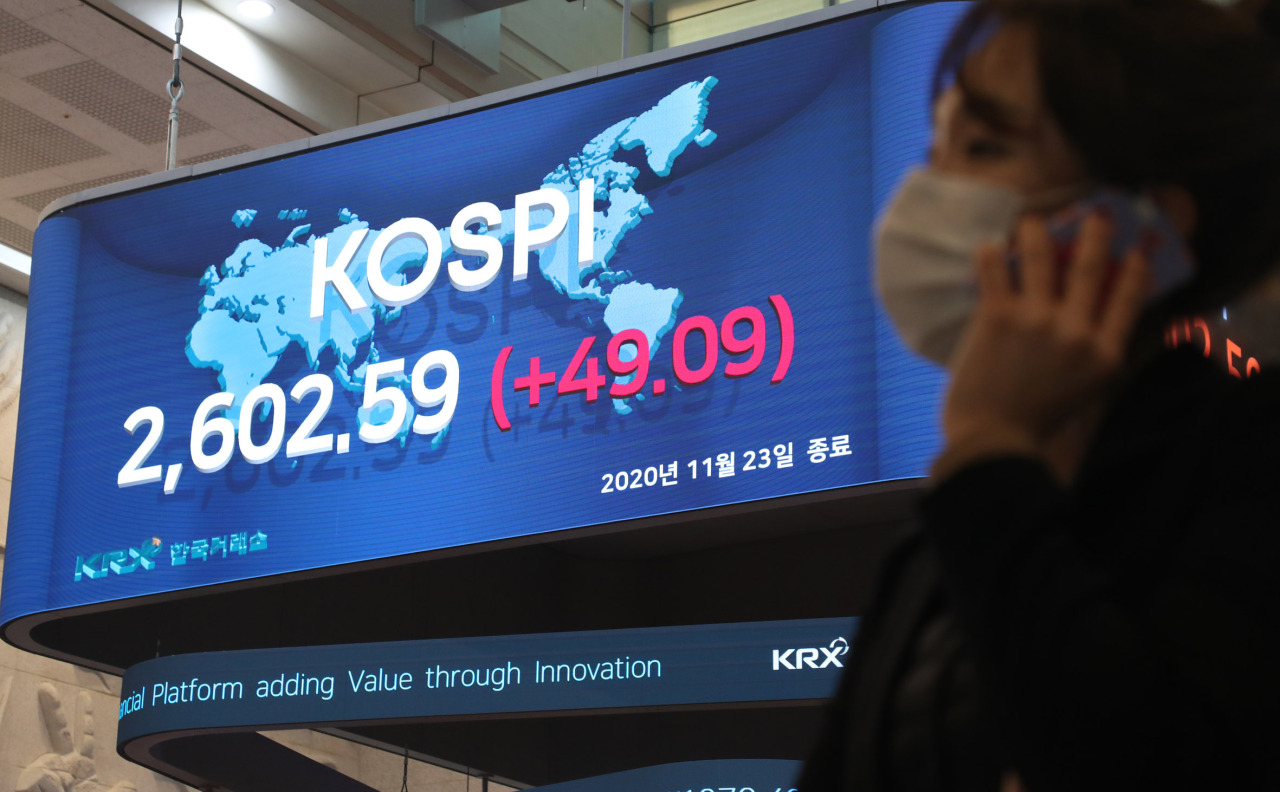Buoyed by a foreign investors’ buying spree that continued into a 13th consecutive session, South Korea’s benchmark Kospi reached a fresh all-time closing high on Monday, amid growing expectations by local brokerage houses that the main bourse could rise further next year.
The main bourse rose 49.09 points, or 1.92 percent, to end at 2,602.59, eclipsing the 2,598.19-point mark reached Jan. 29, 2018. The index is now also only 4.51 points off an intraday high of 2,607.10 seen Jan. 29, 2018.
Kospi got off to a strong start at 2,560.04 and crossed the 2,600-point mark during the morning trade for the first time in 34 months. Accumulated Kospi market capitalization also recorded a fresh high of 1,787 trillion won ($1,607.15 billion), up 98 trillion won from Jan. 29, 2018.
Despite the continuously rising number of daily new coronavirus cases in the country, Kospi was able to hit the highest-ever close led by foreigners’ buying momentum amid a strong Korean won against the US greenback and hopes for vaccines, according to market watchers.
The local currency closed at 1,110.4 won against the US dollar, up 3.9 won from the previous session’s close. In the meantime, offshore investors net purchased some 6.36 trillion won between Nov. 5 and Nov. 23. They bought 988.5 billion won worth of Kospi-listed shares on Monday.
“Despite lingering uncertainties caused by the ongoing COVID-19, hopes for the global economic recovery, on top of the strong won trend and positive outlooks for local businesses next year triggered foreigners to keep purchasing local shares,” said Lee Kyung-min, a market analyst at Daishin Securities.
KB Securities analyst Seo Young-jae added that massive capital has flowed into the market this month, fueled by eased uncertainties over the US presidential election and anticipation for vaccine development. Investors’ preference for high-risk assets is likely to continue for a while.
According to 13 local securities firms’ yearly outlook reports so far, the index is anticipated to reach an upper-end trading band of 2,630-3,000 points amid high hopes of an economic recovery and a better performance by local companies in the coming year.
Heungkuk Securities has offered the highest projection of 3,000, as it expects better economic growth of Asia’s fourth-largest economy, along with listed firms’ improving profits next year, reflecting rising global economic growth and the effects of US President-elect Joe Biden’s victory.
“Korea’s economic growth next year is highly likely to be around the mid-to-end three percent. Driven by improving business performance in industries such as semiconductors and automobiles, the Kospi-listed firms’ profits are also expected to surge by 38 percent,” the report read.
On the contrary, DB Financial Investment has given the lowest forecast of 1,960-2,630 as the brokerage projected the index is likely to stay in a box pattern due to negative factors such as high corporate debt and the lowest fiscal balance among major economies, including the US.
Eleven other securities firms’ trading band projections of the Kospi next year are between 2,700 and 2,900. SK Securities has set its upper-end Kospi target at 2,900 points, citing positive effects of shareholder return policy and partial normalization in trade relations.
Most brokerages presented projections around the 2,800-point level, including NH Investment & Securities (2,800), Meritz Securities (2,250-2,800), Cape Investment and Securities (2,300-2,800), BNK Securities (2,800), Korea Investment & Securities (2,260-2,830) and Samsung Securities (2,100-2,850).
“Local stock is likely to keep its upward momentum in early next year, buttressed by hopes of economic recovery around the globe. But as the Biden administration’s ‘honeymoon’ ends with a rise in interest rate, the index may face an adjustment for a while,” NH Investment & Securities said.
Shinhan Investment and Hana Financial Investment suggested a yearly trading band of 2,100-2,700 and 2,700, respectively, while Hanwha Investment & Securities and KB Securities predicted 2,100-2,700 and 2,750.
By Jie Ye-eun (
yeeun@heraldcorp.com)








